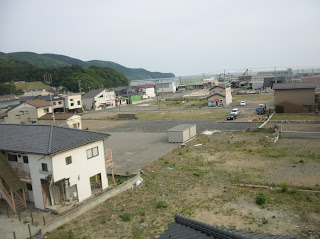This morning Jonathan again brings up the conversations he's overheard by men from the prefecture development staff. After talking about how to make the fish market more accessible, they were discussing the men of the community. The men seldom attend the community uplift events, and they're dealing with loss of job, loss of pride/purpose, just waiting, lack of hope. And the pachinko parlors are booming, but there's no pride in those jobs. We had a time of prayer for family members with serious health needs, for the students who are starting the LST lessons (one is Endo-san, who was stationed on an observation ship in the Gulf of Alaska and speaks Russian), and follow-up visits like with the lady that Danny's group talked and prayed with for 3 hours yesterday. Beth, Michiko, her younger kids, Minori and Shiori, Joyce and I are hreaded to Kitikami Cho for a follow-up visit, with our sweet friend Oikawa-san to whom I was able to send a letter with the help of my tutor back in California. We had a good visit as she told us about he daughter and son and grandchildren.
Beth and Michiko translate for Joyce and me. Oikawa-san tells us that other than a few aches and pains she's doing fine, babysitting her grandkids 2 or three days a week. Today she and Joyce have fun playing adopted grandma to Michiko's kids while we talk.
She shares about her experience with the tsunami and her face was sad as she said that the pictures the grandkids draw are of frightening memories. Then she insisted on feeding us some rice with bamboo shoots anhd coffee and okashi (snacks and cookies). We take pictures and give her a present and she gives me a letter and I say I will ask my tutor Yamajo-sensei to translate it for me.
We drive west back up the river, then southeast into Ishinomaki, pick up the Straker's oldest boy Hiji, then take them home. After dropping me off at BeOne, Beth heads for her apartment to curl up with her cold. Then Chad takes Joyce and me over to help Eric and his daughter Ani finish planting a tree in Suzuki-san's yard.
First Chad and I walk up the street to check on kikiuchi yasuhiro, the guy with the juku (cram school) that I met last year, but he isn't home.
Next Chad rushes off to a meeting and Suzuki-san invites the rest of us inside to see how she'd fixed her house back up, and it is picture-perfect, of course, every room and wall and fusuma (sliding door) exuding soothing simple harmony, as if a tea ceremony awaits. And then Suzuki-san asks Ani if she wants to see the tower and Ani says, "I'm not afraid," so the four of us take the stairs to the third floor, and there is a ladder and a hatch leading to a small, enclosed 360-degree lookout room, because Suzuki-san's late husband enjoyed the sea, and his favorite place used to be up here where he could gaze at the sea and sky.
Suzuki-san tells us the neighborhood name means "happytown" in Japanese, but from the view we can see just how many houses have been bulldozed away. Soon after we come down we realize why Chad took off so quickly, because we're guided into the dining area and encompassed in a net of over-the-top hospitality, as Suzuki-san sets us down at the chabudai (low table) and for the next hour brings us dish after dish: vitamin C soda, iced coffee, corn on the cob,
red rice (named for the red beans it's cooked with, but don't season it with soy sauce, use sesame seeds instead), grilled whole fish, tofu and seaweed soup, creme filled rolls, a tray of sashimi, a melon filled with cherries for dessert, and a cup of pocari sweat (like gatoraide) for a final "kampai" (cheers!).
With the last few courses, poor Ani is saying, "I think I might need to finish this at home." And when we're stuffed and I think she must have run out of food, Suzuki-san goes to get the handwritten poster
her daughter helped make to put on the front of her house thanking all the volunteers who helped clean the mud out. And she thanks us for planting the tree. And I tell Eric please tell her, "it was only one small tree, but all this food. . ." And she says, "but that was work, and this is my hobby."
And we take pictures and she stuffs more thing into our bags, and we drive away and she waves and we wave and she is still bowing and waving as we turn the corner. And Eric tells me the heartbreaking part: last year at the funeral for the adult daughter she lost in the tsunami, she prayed telling her daughter, "I'll see you soon," because she felt she had no reason to live; but then the volunteers came and started pitching in--helping her, and then the next time she talked to the daughter she lost she said, "sorry I won't be seeing you for a while after all; I have something to live for now."








No comments:
Post a Comment